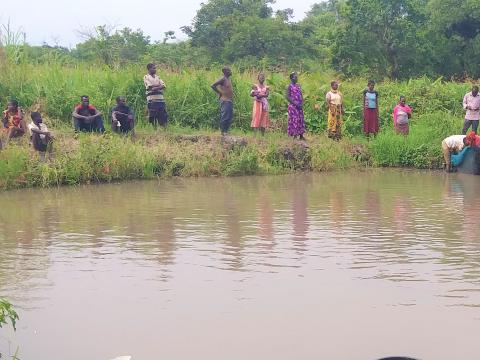Women farmers transform South Sudan’s marshlands into fish farms and vegetable gardens

Mary Jasua Daima, a 42-year old single mother with seven children, leads the women’s group with 20 members. “We started with three fishponds in 2019 and grew three more each year. We now have established a total of nine fishponds fully stocked with fingerlings”, she shares.
The Zigbi fish farm is a women-led livelihood project located in Western Equatoria State’s Nzara town with an estimated population of 2,300 people. World Vision’s community-based participatory planning has identified the area for its food security program in 2020 its population suffered from flooding and fire that razed properties.
In response to the fires and flooding, World Vision and the World Food Programme (WFP) launched the Cash for Assets Project (CFA) to restore livelihoods by helping create functioning and productive assets that can enhance the resilience of families.
At least 20 people have identified the Zigbi stream as a potential livelihood resource and requested for support on fish farming and vegetable gardening. To avoid overlapping of activities, the fish farm began on April-June 2019 and the vegetable garden from July to September.
Mary joined the project after the death of her husband. She recalls, “Life was very hard for me and the children. I could hardly feed and provide for my children’s needs, and I had no plot to farm to raise our own food.”
Some households like Mary’s were also assisted with short-term food support, and the families were encouraged to start setting-up their own fishponds that will prepare them to become independent from assistance in the future.
From a flooded area to fishponds, the project and the women’s hardwork made this a reality. It proved that people can rise from climate-driven adversities.
Mary, who also did subsistence farming on the side, said that the whole community is impressed with the steady growth they all enjoyed because of the project. She added that the fishponds did not only bring additional income but also provided her family with stable source of nutritious food.
Now a proud owner of a plot she acquired from her income, Mary is able to send five of her children to a good school in Nzara County. Her eldest will be taking her South Sudan certificate in secondary education this year.
She added; “Our fish farm supplies the community with nutritious food, and the vegetable garden supplement us with added income. The village savings loan association (VSLA) that was established helped us to engage in our own income generating activities.”
“I have not imagined myself being able to buy a mobile phone. Now I have one and can call any time to connect with my family. I can even inform our customers of our available fish and vegetable supply,” Mary says with a smile.
Project Manager Simon Beeyo said the project has empowered the women in Nzara and have shown a strong example of climate adaptation. He adds, “From a flooded area to fishponds, the project and the women’s hardwork made this a reality. It proved that people can rise from climate-driven adversities.”
“Climate change is not the end of livelihood options. This is a practical example that we can build from the worst. The women made it happen from a disaster zone to a fish and vegetable farm. It is impressive”, adds Simanga Ndebele, Zonal Program Manager of Western Equatoria Zone.
Country Director Dr. Mesfin Loha further reiterated that more of these projects are needed and implemented to help transform families in these climate-induced shocks. The project helped enhance community resilience and transform the lives of the people to uplift their own children’s lives.
Story by Victor Diko, Monitoring and Evaluation Officer I Photos by WVSS Field Team